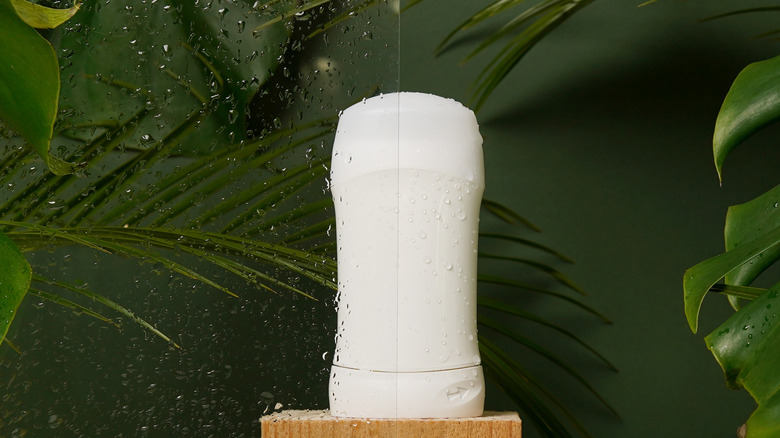Ingredients You Don't Want To See In Your Deodorant
On one hand, it's great to see the explosion of interest in healthier approaches to personal care, but it doesn't make things simpler for the consumer. Facing the wall of deodorants and antiperspirants at the grocery store can easily feel overwhelming. Let's break down a few of the most concerning ingredients commonly found in deodorants and antiperspirants, and why to avoid them.
Aluminum tops the list of ingredients to avoid. It's usually found in antiperspirants, which actually work to block sweating, (not deodorants, which work only to mask odors). According to experts at Healthline, the aluminum salts soften into your pores and form a gel-like substance that effectively blocks the pores and prevents sweating — and therefore also stinking!
The problem is that the aluminum in antiperspirant has long been suspected of contributing to breast cancer in both women and men. The aluminum can permeate through the skin barrier and affect the tissue in the breast. However, the American Cancer Society maintains that there is no conclusive evidence that the aluminum actually causes breast cancer.
There are now many safe deodorant alternatives
Another group of chemicals to watch out for are parabens. These are preservatives that act as endocrine disruptors, which means that they disrupt or mimic normal hormonal activity (via Environmental Working Group). Again, although the link is not conclusive, there is concern about the potential link to breast cancer. Dr. Philippa Darbre from the University of Reading led a team which studied breast tissue samples from women who had had mastectomies, and found evidence of parabens in almost all of them (via Daily Mail). She stated, "The fact that parabens were detected in the majority of the breast tissue samples cannot be taken to imply that they actually caused breast cancer in the 40 women studied. However, the fact that parabens were present in so many of the breast tissue samples does justify further investigation."
Another ingredient to watch for on the label is phthalates. These commonly hide behind the umbrella term "fragrance." Phthalates are added to help the fragrance linger on the skin. But in this case, smelling nice may come at a high cost. Phthalates are suspected to interfere with the body's production and use of the hormone testosterone — a problem which applies to both men and women in varying degrees. Heather Patisaul, Ph.D., an associate professor of biology at North Carolina State University, notes, "The greatest concern when it comes to phthalates is that they could impair reproductive ability in men, or that they could impact fetal development in pregnant women" (via TIME).
Fortunately, there are now many options for taming the pits without risking the potentially harmful effects that these ingredients could have. Patisaul adds, "The more people spend their money on products that don't contain these chemicals, the more manufacturers will move away from using them."


